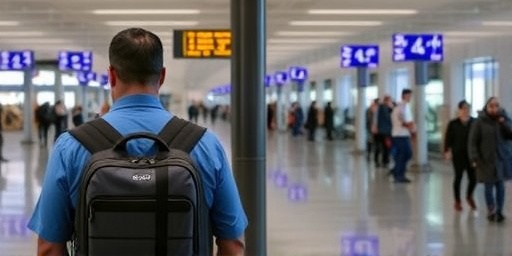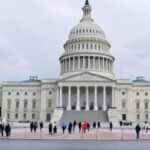Major U.S. airports are grappling with unprecedented chaos as Transportation Security Administration (TSA) officers call out sick in droves amid the ongoing government shutdown, leading to Airport delays that have frustrated millions of travelers. In Houston’s George Bush Intercontinental Airport, lines snaked for hours on the second straight day, with some passengers missing flights after waiting up to three hours just to clear security. This surge in travel disruption is directly linked to a severe staffing shortage, with data showing that 84% of delays now stem from understaffed checkpoints, a stark contrast to the mere 5% seen before the shutdown began.
- Houston’s Bush Airport Hit Hardest by TSA Line Nightmares
- Nationwide TSA Shortage Fuels 84% Spike in Flight Delays
- Travelers Vent Frustration Over Unpaid TSA Officers and Endless Lines
- Union Pushback and Calls for Shutdown Resolution Intensify
- Future Travel Woes: Experts Predict Escalating Disruptions Without Shutdown End
Houston’s Bush Airport Hit Hardest by TSA Line Nightmares
At the epicenter of this crisis is Houston’s George Bush Intercontinental Airport (IAH), where the shutdown impact has turned routine security screenings into marathons of misery. On Tuesday, travelers reported wait times exceeding 120 minutes, forcing airport officials to issue apologies via social media and even deploy additional local law enforcement to manage the crowds. “It’s absolute pandemonium,” said Sarah Jenkins, a business traveler from Dallas who missed her connecting flight to New York. “I’ve flown through here dozens of times, but nothing compares to this level of Airport delays caused by the TSA staffing shortage.”
The situation escalated when over 200 TSA officers at IAH called out sick, citing exhaustion and frustration over unpaid wages during the shutdown. Union representatives for the American Federation of Government Employees (AFGE) confirmed that absenteeism rates have spiked by 300% since the partial government closure started three weeks ago. This isn’t isolated; similar scenes unfolded at Dallas/Fort Worth International Airport, where lines backed up into parking garages, and at Los Angeles International (LAX), where families with young children waited in sweltering heat without access to amenities.
Airport data from the U.S. Department of Transportation reveals that IAH alone processed 15% fewer passengers on peak days due to these bottlenecks, resulting in an estimated $2.5 million in lost revenue for airlines and concessions. Experts attribute this to the TSA’s reliance on federal funding, which has frozen paychecks for 800,000 government workers, including screeners. “The shutdown impact on essential services like airport security was predictable but devastating,” noted aviation analyst Dr. Elena Ramirez from the University of Texas. “Without swift intervention, these travel disruptions could cascade into broader economic ripples.”
Nationwide TSA Shortage Fuels 84% Spike in Flight Delays
The ripple effects of the TSA staffing shortage extend far beyond Texas, with Airport delays plaguing hubs from coast to coast. According to a preliminary report from the Bureau of Transportation Statistics, 84% of all flight delays in the last week were attributed to security bottlenecks, up dramatically from the pre-shutdown average of 5%. Major carriers like American Airlines and United Airlines have issued travel advisories, urging passengers to arrive at least three hours early for domestic flights—a recommendation that has become the new normal.
In Chicago’s O’Hare International Airport, one of the busiest in the world, TSA lines peaked at 90 minutes on Monday, leading to over 50 flight cancellations. “We’re seeing a perfect storm of staffing shortage and holiday travel demand,” explained TSA spokesperson Lisa Farbstein in a press briefing. She highlighted that while the agency is cross-training non-essential personnel to fill gaps, the effort falls short amid the shutdown’s freeze on hiring and overtime pay. Quotes from affected passengers underscore the human toll: “I spent more time in line than on my vacation,” lamented retiree Michael Torres from Miami International Airport (MIA), where similar delays have snarled international arrivals.
Statistically, the numbers paint a grim picture. The Federal Aviation Administration (FAA) logged 1,200 delay incidents directly tied to security waits over the past weekend, compared to under 200 in the same period last year. This travel disruption has disproportionately affected business travelers and families, with a survey by travel site Kayak indicating that 62% of respondents are reconsidering holiday plans due to the chaos. Economists warn that prolonged airport delays could shave 0.2% off the U.S. GDP in the fourth quarter, as delayed shipments and canceled meetings disrupt commerce.
- Key Stats on Shutdown Impact:
- 84% of delays linked to TSA issues (up from 5% pre-shutdown)
- 300% increase in sick calls among TSA officers
- Over 1,000 flights delayed or canceled nationwide last week
- $10 million estimated daily loss for the airline industry
Behind the scenes, TSA leadership is scrambling. Internal memos leaked to news outlets reveal contingency plans, including reduced screening for low-risk passengers via programs like TSA PreCheck, but even those lanes are overwhelmed. The staffing shortage, exacerbated by the shutdown, has forced some airports to implement ‘family lanes’ for quicker processing of groups with children, though effectiveness varies.
Travelers Vent Frustration Over Unpaid TSA Officers and Endless Lines
Personal stories emerging from the front lines highlight the raw frustration of airport delays amid this unprecedented travel disruption. At Atlanta’s Hartsfield-Jackson International Airport, the world’s busiest, a viral video captured a family of five waiting two hours with a toddler in tow, only to have their flight depart without them. “The TSA officers looked as exhausted as we felt—many haven’t been paid in weeks,” recounted passenger Emily Chen in an interview with local media. Her sentiment echoes a chorus of complaints flooding social media under hashtags like #TSAShutdown and #AirportDelays.
Interviews with TSA officers, speaking on condition of anonymity, reveal deep morale issues. One veteran screener from Phoenix Sky Harbor International Airport shared, “We’re calling out because we can’t afford to work without pay. Families are struggling, and it’s showing in the lines.” The AFGE union has ramped up pressure, organizing rallies outside Capitol Hill to demand an end to the shutdown. Union president Everett Kelley stated, “This staffing shortage is a direct result of congressional inaction. TSA officers are patriots, not pawns in a political game.”
Consumer advocacy groups are also weighing in. The Travelers United nonprofit filed a complaint with the Department of Homeland Security, arguing that the shutdown impact violates passengers’ rights to timely service. Meanwhile, airlines are offering limited waivers for rebooking, but not compensation, citing the delays as force majeure. A poll by CNN showed 78% of Americans blaming the government shutdown for the mess, with calls for bipartisan resolution growing louder.
To mitigate the chaos, some airports have rolled out innovative measures. Denver International, for instance, introduced mobile charging stations and water refill points along extended lines, while Boston Logan activated temporary holding areas with entertainment for waiting passengers. Yet, these band-aids do little to address the root cause: the TSA staffing shortage that leaves checkpoints under 70% capacity during peak hours.
Union Pushback and Calls for Shutdown Resolution Intensify
As the government shutdown stretches into its fourth week, labor unions representing TSA workers are amplifying their voices against the staffing shortage fueling nationwide travel disruption. The AFGE, which represents over 30,000 TSA employees, has threatened coordinated sickouts if paychecks aren’t forthcoming. “Our members are on the brink,” Kelley reiterated in a statement. “The airport delays we’re seeing are just the tip of the iceberg—what happens when morale completely collapses?”
Political figures are responding, albeit slowly. House Speaker Nancy Pelosi urged swift action in a floor speech, linking the shutdown impact to national security risks at airports. On the other side, Senate Majority Leader Mitch McConnell tied resolution to border wall funding, prolonging the stalemate. Bipartisan senators, including Lindsey Graham (R-SC) and Cory Booker (D-NJ), co-sponsored a bill to guarantee pay for essential workers like TSA officers during shutdowns, but it faces uncertain passage.
Industry stakeholders are equally vocal. The Airports Council International-North America estimated that prolonged airport delays could cost the sector $500 million monthly in lost productivity. Airlines for America, a trade group, lobbied for emergency funding, warning of potential safety lapses if the TSA staffing shortage persists. “Security can’t be compromised for politics,” CEO Nicholas Calio emphasized.
Looking at historical precedents, the 2013 shutdown caused similar but less severe disruptions, with TSA absenteeism at 10% versus today’s 25%. Analysts predict that without a deal by year’s end, holiday travel could see even worse chaos, with Thanksgiving projections already showing 20% longer wait times.
Future Travel Woes: Experts Predict Escalating Disruptions Without Shutdown End
As the holiday rush looms, experts forecast a worsening of airport delays and travel disruption unless the government shutdown concludes soon. Projections from the FAA indicate that without additional staffing, wait times could average 45 minutes nationwide by mid-December, up from 15 minutes pre-shutdown. “The shutdown impact is compounding daily,” warned transportation economist Dr. Marcus Hale from MIT. “We’re looking at a domino effect: delayed flights lead to missed connections, stranded passengers, and strained airline operations.”
Potential next steps include expanded use of private security firms at select airports, though legal hurdles abound. The TSA is exploring voluntary overtime incentives funded by airline contributions, but union approval is pending. Travelers are advised to opt for off-peak flights and utilize apps like MiFlight for real-time line estimates. In the long term, lawmakers may push for shutdown-proof pay legislation to prevent future staffing shortages.
Ultimately, resolution hinges on Washington. With Thanksgiving just weeks away, the pressure mounts for a compromise that eases the TSA burden and restores smooth air travel. Until then, passengers brace for more lines, more delays, and a stark reminder of how political gridlock can ground the nation’s skies.








